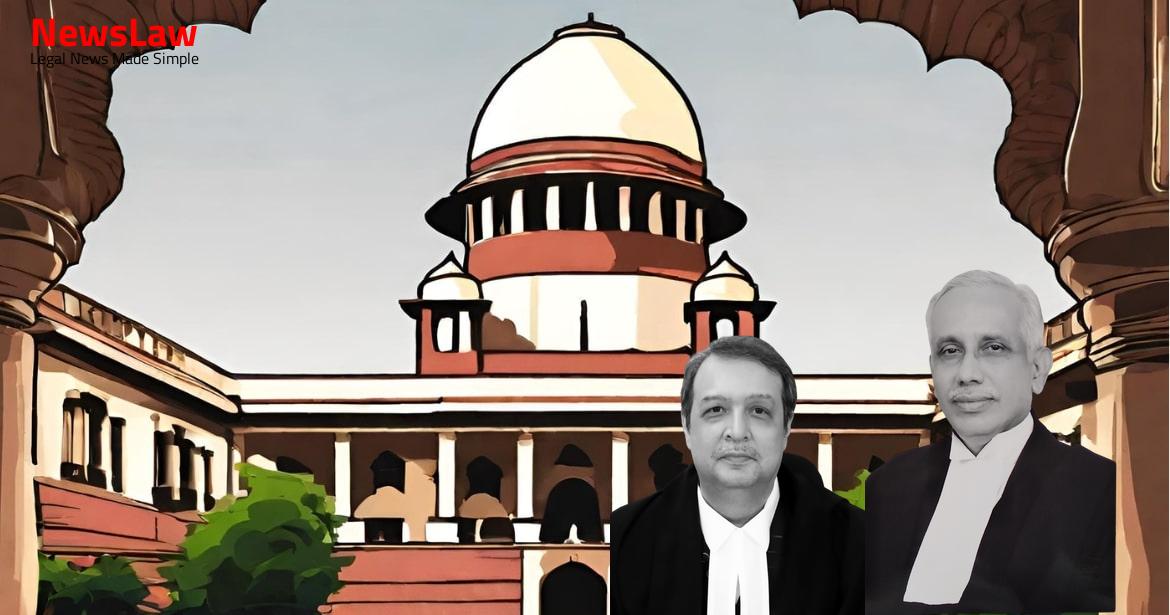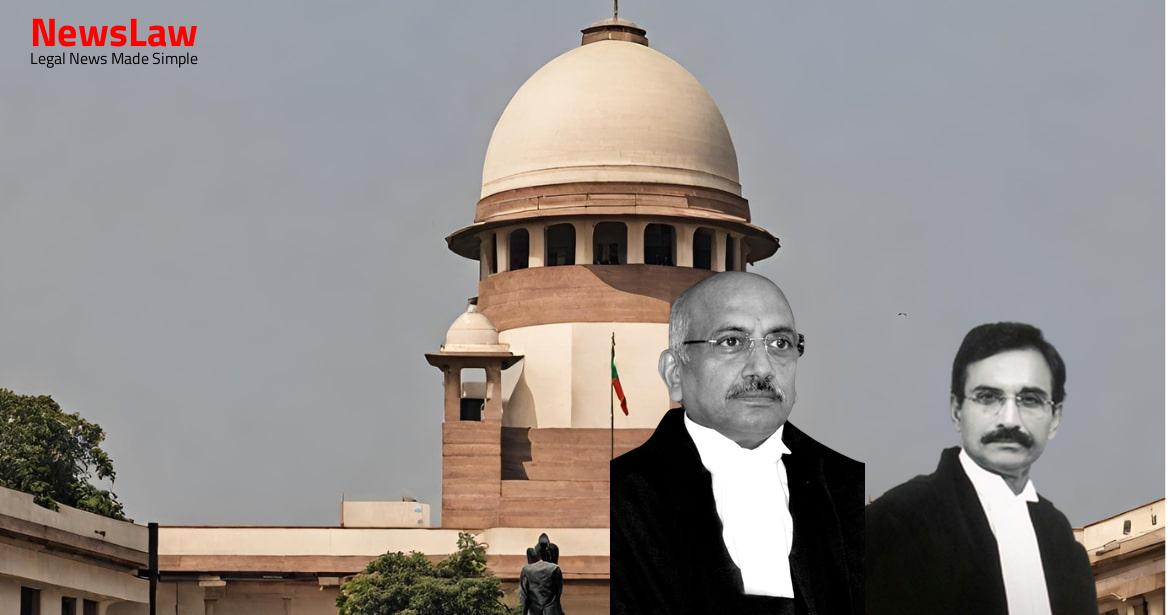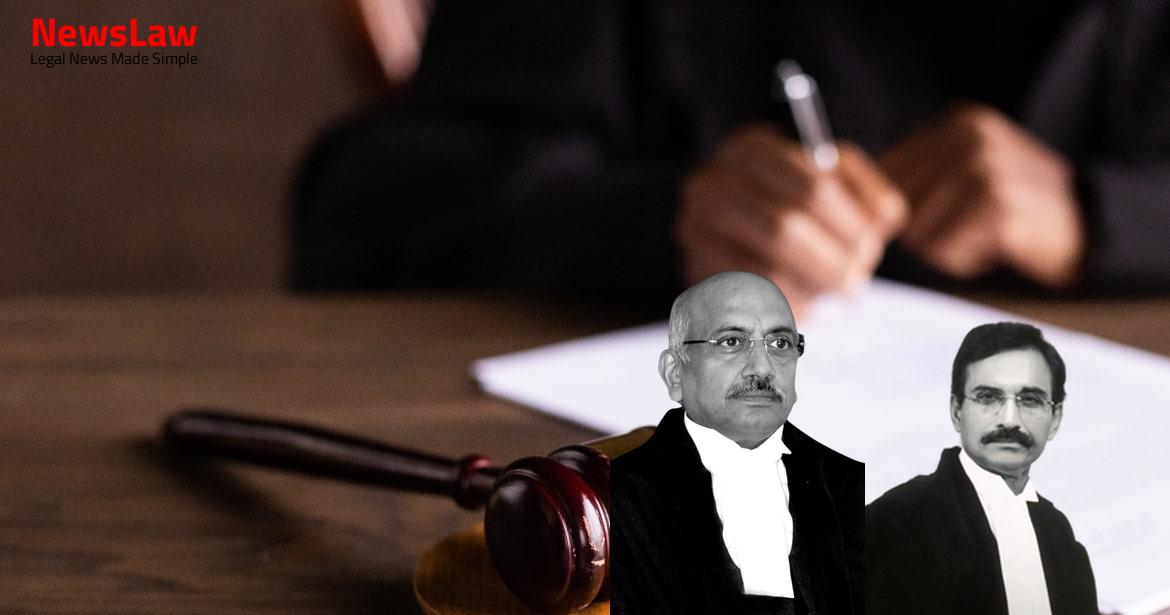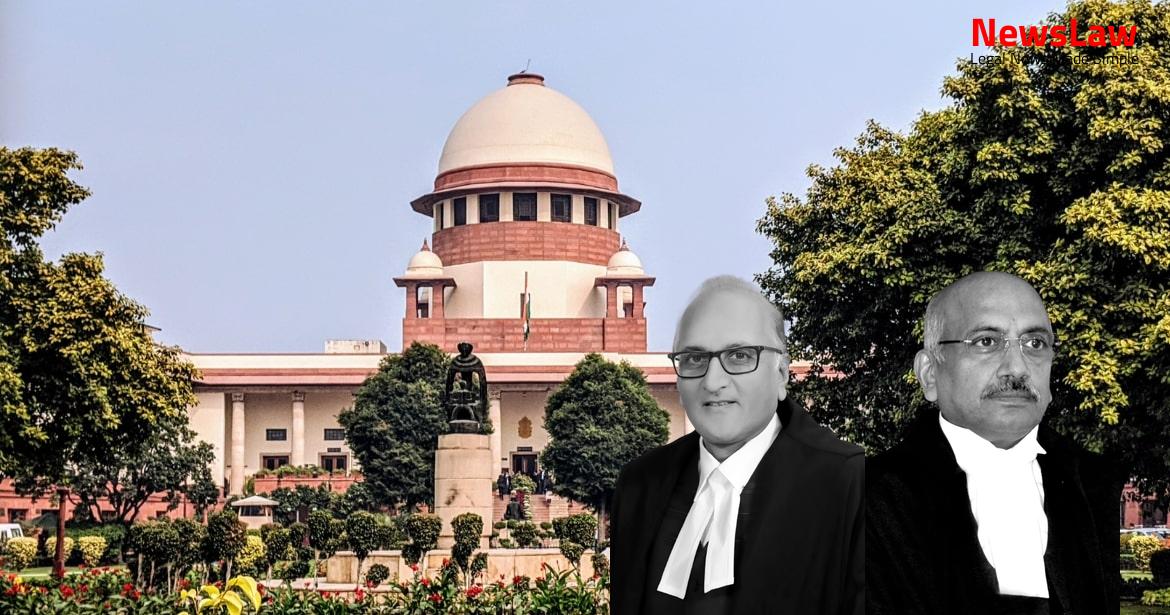The question that falls for our consideration is: whether the requirement of ‘continuing unlawful activity’, as defined under Section 2(1)(c) of the 2015 Act, necessarily requires a separate FIR to have been registered against any purported member of a gang after the promulgation of the 2015 Act i.e., after 01.12.2019? On 27.11.2020 an FIR came to be registered against the respondent accused herein and thirteen other co-accused for the offence punishable under Sections 3(1)(i) and (ii), 3(2) and 3(4) resply of the 2015 Act. In such circumstances referred to above, the High Court took the view relying on the decision of this Court in the case of Shiva alias Shivaji Ramaji Sonawane (supra) that the five FIRs, which were registered in the past for different offences under the Indian Penal Code (IPC) cannot be construed as a ‘continuing unlawful activity’ of the respondent-accused so as to prosecute him under the provisions of the 2015 Act. Sections 2(c) and (f) which define “continuing unlawful activity” and “organized crime syndicate” read as under: (c) “continuing unlawful activity” means an activity prohibited by law for the time being in force, which is a cognizable offence punishable with imprisonment for a term of three years or more, undertaken either singly or jointly, as a member of an organised crime syndicate or on behalf of such syndicate in respect of which more than one charge-sheets have been filed before a competent court within the preceding period of ten years and that court has taken cognizance of such offence; (f) “organised crime syndicate” means a group of two or more persons who, acting either singly or collectively, as a syndicate or gang indulging in activities of organised crime; The combined reading of the aforesaid provisions suggest that there has to be a continuing unlawful activity carried out by an organized crime syndicate, for which more than one charge sheets have been filed before a competent court within the preceding period of ten years, and that the court has taken cognizance of such offence.
It was in the above backdrop that the High Court held that once the respondents had been acquitted for the offence punishable under the IPC and Arms Act in Crimes No.37 and 38 of 2001 and once the Trial Court had recorded an acquittal even for the offence punishable under Section 4 read with Section 25 of the Arms Act in MCOCA Crimes No.1 and 2 of 2002 all that remained incriminating was the filing of charge sheets against the respondents in the past and taking of cognizance by the competent court over a period of ten years prior to the enforcement of the MCOCA. The filing of charge sheets or taking of the cognizance in the same did not, declared the High Court, by itself constitute an offence punishable under Section 3 of the MCOCA.
It is only if an organised crime is committed by the accused after the promulgation of MCOCA that he may, seen in the light of the previous charge sheets and the cognizance taken by the competent court, be said to have committed an offence under Section 3 of the Act. The High Court was, therefore, right in holding that Section 3 of the MCOCA could not be invoked only on the basis of the previous charge sheets for Section 3 would come into play only if the respondents were proved to have committed an offence for gain or any pecuniary benefit or undue economic or other advantage after the promulgation of MCOCA. Thus, the contention raised by the learned Advocate with regard to the prospective effect of the Act is not palatable in view of the aforesaid observations made by the Apex Court, but at the same time it is noticed in the present case, that the expression “continuing unlawful activity” is not satisfied in view of the offences which are considered by the authority.
No.14/209 under sections 364(A), 387, 120(B), 114 of the IPC has been quashed by this Court vide order dated 03.12.2019 passed in Criminal Misc.
It is clarified that this Court has not expressed any opinion with regard to the applicant not being a member or a member of the crime syndicate.” Being dissatisfied with the aforesaid impugned order passed by the High Court releasing the respondent-accused on bail, the State of Gujarat is here before this Court with the present appeal. The phrase ‘within the preceding period of ten years’ by itself indicates that the ‘continuing unlawful activity’ may be such activity, which could be said to have been committed prior to the enactment of the 2015 Act. It is in such factual background that this Court in Shiva alias Shivaji Ramaji Sonawane (supra) could be said to have observed that it is only if an organised crime is committed by the accused after the promulgation of Maharashtra Control of Organised Crime Act, 1999 (for short, ‘the MCOCA’) that he may, seen in the light of the previous chargesheets and the cognizance taken by the competent court, be said to have committed an offence under Section 3 of the MCOCA. If such an interpretation is accepted then the State will have to wait and helplessly watch the organised crime taking place till it is the third time a person or a syndicate is found involved in the offence after the 2015 Act came into operation w.e.f. In such circumstances, the intention of the Legislature could not have been other than giving immediate effect to the 2015 Act by taking note of all the offences or chargesheets registered within ten years prior to the commencement of the 2015 Act.
The learned counsel would submit that if the interpretation put forward by the learned Solicitor General is accepted then the same would be in breach of Article 20(1) of the Constitution which provides that no person shall be convicted of an offence except for one which is in violation of any law in force at the time of commission of the act charged as an offence nor be subjected to a penalty greater than that which might have been inflicted under the law in force at the time of commission of the offence. He would argue that there is no merit in the contention canvassed on behalf of the appellant-State that offence of organised crime itself comprises of chargesheets filed in the past of which cognizance is taken. The Gujarat Control of Terrorism Act, 2015, as its long title indicates, is ‘an Act to make special provisions for the prevention and control of terrorist acts and for coping with criminal activities by organised crime syndicates and for the matters connected therewith or incidental there to’. Organised crime syndicate (Section 2(1)(f)); and c. Section 2(1)(c) – “continuing unlawful activity” means an activity prohibited by law for the time being in force, which is a cognizable offence punishable with imprisonment for a term of three years or more, undertaken either singly or jointly, as a member of an organised crime syndicate or on behalf of such syndicate in respect of which more than one charge-sheets have been filed before a competent court within the preceding period of ten years and that court has taken cognizance of such offence; The above definition of organised crime, as its elements indicate, incorporates two other concepts namely, a continuing unlawful activity and an organised crime syndicate.
Section 2(1)(c) while defining ‘continuing unlawful activity’ and Section 2(1) (e) while defining ‘organised crime’, both contain the expression ‘as a member of an organised crime syndicate or on behalf of such syndicate’. Sub- section (2) covers whoever conspires or attempts to commit or advocates, abets or knowingly facilitates the commission of an organised crime or any act preparatory to organised crime. (3) Whoever intentionally harbours or conceals or attempts to harbour or conceal any person who has committed an offence of any terrorist act or any member of an organised crime syndicate shall be punishable with imprisonment for a term which shall not be less than five years but which may extend to imprisonment for life and shall also be liable to fine which shall not be less than rupees five lakhs.
(5) Whoever holds any property derived, or obtained from commission of terrorist act or an organised crime or which has been acquired through the organised crime syndicate funds shall be punishable with imprisonment for a term which shall not be less than three years but which may extend to imprisonment for life and shall also be liable to fine which shall not be less than rupees two lakhs.
A close analysis of the term, ‘organised crime’ would indicate that there has to be an activity prohibited by law for the time being in force which is a cognizable offence punishable with imprisonment of three years or more, undertaken as singly or jointly as a member of organised crime syndicate or on behalf of such syndicate, in respect of which activity more than one chargesheets have been filed before a competent court within the preceding period of ten years and the Court has taken cognizance of such offence. However, if the provisions of the 2015 Act are invoked in a given case, then, in addition to the aforementioned broad principles, the limitations imposed in the provisions contained in sub-section (4) of Section 20 of the 2015 Act should not be lost sight of while dealing with application for grant of bail. (4) Notwithstanding anything contained in the Code, no person accused of an offence punishable under this Act shall, if in custody, be released on bail or on his own bond, unless – (a) the Public Prosecutor has been given an opportunity to oppose the application of such release; and (b) where the Public Prosecutor opposes the application, the Special Court is satisfied that there are reasonable grounds for believing that accused is not guilty of committing such offence and that he is not likely to commit any offence while on bail.” It is plain from a bare reading of the non-obstante clause in the sub-section that the power to grant bail by the High Court or Court of Sessions is not only subject to the limitations imposed by Section 439 of the Code but is also subject to the limitations placed by Section 20(4) of the 2015 Act. The reasonable belief contemplated in the provisions requires existence of such facts and circumstances as are sufficient in themselves to justify satisfaction that the accused is not guilty of the alleged offence.
The wording of Section 21(4), in our opinion, does not lead to the conclusion that the court must arrive at a positive finding that the applicant for bail has not committed an offence under the Act. However, while dealing with a special statute like MCOCA having regard to the provisions contained in sub-section (4) of Section 21 of the Act, the court may have to probe into the matter deeper so as to enable it to arrive at a finding that the materials collected against the accused during the investigation may not justify a judgment of conviction. We may now proceed to look into the decision of this Court rendered in the case of Shiva alias Shivaji Ramaji Sonawane (supra). The High Court after referring to the various provisions of the MCOCA looked into its own decision delivered by a Division Bench in the case of Jaisingh Ashrfilal Yadav and Others v. In other words, lodging of two charge-sheets in relation to the acts which are already declared under the law then in force as offences of the nature specified under Section 2(d) during the preceding period of ten years is one of the requisites for the offence of organised crime under the said Act.”
(Emphasis supplied) 43.
In other words, it provides that the activities which were offences under the law in force at the relevant time and in respect of which two charge-sheets have been filed and the Court has taken cognizance thereof, during the period of preceding ten years, then it will be considered as continuing unlawful activity on 24-2-1999 or thereafter. State of Maharashtra, reported at 2003 All MR (Cri) 1061
the challenge to the constitutional validity of MCOC Act, was considered by another Division Bench. The definition therefore treats as equal persons who are hopelessly unequal that is to say a person who is a known criminal but charge- sheeted and convicted not more than once and another who has been falsely charged with 10 fabricated charges and acquitted of all the 10 charges with a finding that the charges were fabricated yet merely because cognizance has been taken of that charge are treated as person engaged in continuous unlawful activity.
According to him therefore a person is acquitted, of, ten charges cannot be treated as equal to a person who charged and convicted of only one offence.
The activity must be continuing unlawful activity and to define it with clarity it is provided that any person who in the past was charge-sheeted for more than one charge of such activity or crime the cognizance of which has been taken and imprisonment for which is more than three years should be taken into account. We also do not find substance in the challenge that the equality clause in the Constitution is violated because the definition ropes anyone charged more than once, irrespective of whether the charge resulted in an acquittal or conviction. The judgment of the High Court of Judicature at Bombay in the case of Bharat Shantilal Shah (supra) was challenged by the State of Maharashtra before this Court in so far as it held Sections 13 to 16 resply of the MCOCA as unconstitutional. There was no cross appeal filed by Bharat Shah challenging the order of the High Court upholding the constitutional validity of the provisions of Sections 2(1)(d), (e) and (f) and Sections 3 and 4 respectively of the MCOCA. The High Court of Judicature at Bombay had specifically held as affirmed by a three-Judge Bench decision of this Court that had punishment been provided for continuing unlawful activity, the submission that while punishing, it treats unequals as equals may carry weightage. The definitions in clauses (d) and (e) resply of sub- section (1) clearly indicate that one of the components of organised crime is continuing unlawful activity and, therefore, organised crime is something more than mere continuing unlawful activity. If only the past charge- sheets were to be enough to constitute offence of organised crime, it could have offended the requirement of Article 20(1) of the Constitution and possibly Article 20(2) as well, (and in any case Section 300 of the Cr PC). Section 21 of MCOCA which prescribes modified applications of the Code to offences under MCOCA does not make provisions of Section 300 of the Cr PC inapplicable. If no illegal activity as contemplated by MCOC Act are committed after 1999, then the past activities prior to 1999 may not be of any help for registering any FIR only on the basis of those past activities as has been observed by the Division Bench (R.M.S. While offences committed prior to 24-2-1999 cannot amount to “organised crime”, since this offence was not on statute book then, even post-24-2-1999 crimes could be tried as “organised crime” only if information in respect of these crimes is permitted to be registered as organised crime and sanction is accorded for prosecution for such crime under Section 23 of MCOCA. Had this been contemplated, the learned Judge, Special Court, would have charged Accused No 1/I Shiva of offence punishable under Section 3(1)(i) of MCOCA and not one punishable under Section 3(1)(ii) of the MCOCA, since Shiva had been charged once of murder (Sr.
In view of this, since the appellants are not shown to have indulged in any crime which can be said to be continuation of past criminal activity provisions of Section 3(1) of the MCOCA are not attracted. This obviously discloses that the approving authority has to apply its mind about the applicability of the provisions of the MCOC Act to the facts disclosed in a matter before allowing the recording of FIR and for that purpose, he must be, prima facie, satisfied about the commission of offence of organised crime under the MCOC Act by the person or persons against whom the FIR is to be recorded.
Case Title: THE STATE OF GUJARAT Vs. SANDIP OMPRAKASH GUPTA (2022 INSC 1288)
Case Number: Crl.A. No.-002291-002291 / 2022



